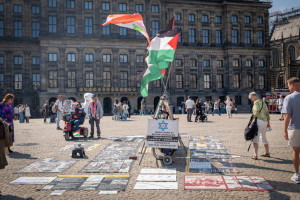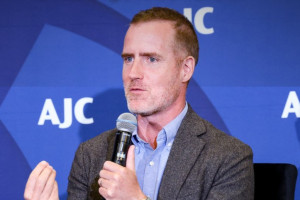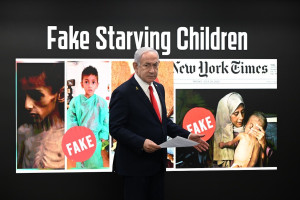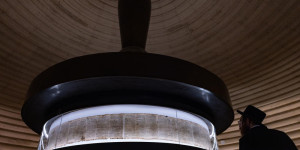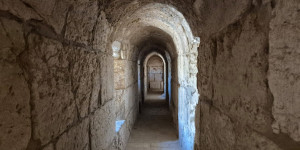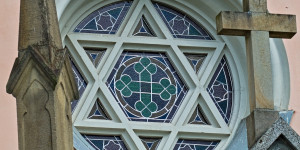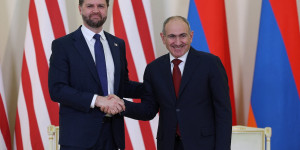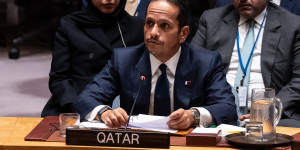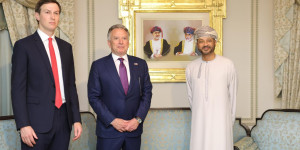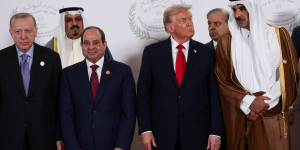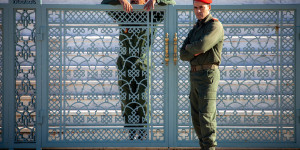In the Hamas-Israel war, can a camera be as dangerous as a gun?
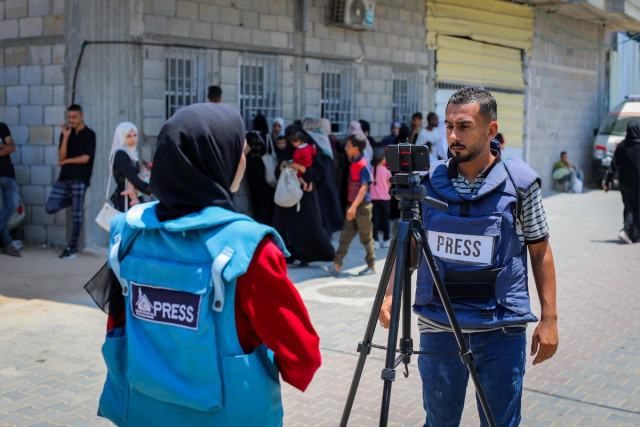
A terrorist doesn't need to carry an RPG or launch a rocket to be dangerous.
In the Hamas–Israel war, the lines are increasingly blurred over what – and who – a terrorist is. Increasingly, the most potent weapons are not explosives but influence. On what many now call the war's "eighth front," the fight is waged with words, images, and carefully crafted narratives.
Hamas and other terrorist propagandists are no less dangerous than fighters on the ground. They might never fire a shot, but their words and images can fuel violence, sway public opinion, and tie the IDF’s hands. This “information front” shapes decisions, chips away at morale, and can change the very direction of the war.
The deadly consequences of this front came into sharp focus earlier this week, when the IDF targeted a tent in Gaza where journalists were staying, near the main entrance to Gaza City's Al-Shifa Hospital. Six journalists and camera operators were killed, including Anas Al-Sharif, one of Al Jazeera's most prominent correspondents in Gaza.
The incident sparked outrage, with critics shouting, "Where is freedom of the press?" But Israel presented evidence that Al-Sharif was a paid member of Hamas' military wing – a revelation that underscores a larger, often-missed point: these journalists were not "press" in the way the West typically understands the term.
Independent researcher Eitan Fischberger told ALL ISRAEL NEWS that there is a fundamental difference between how the West perceives media and how the enemies of the West perceive it. The West sees journalists as independent thinkers, working to present facts and preserve democracy. Anti-Western forces, he explained, view the media as one of their tools of terror.
"They see these guys as part of their terrorist army," Fischberger said. "There is a reason a lot of these guys, when they are 'martyred,' are referred to as 'resistance journalists.'"
In his view, Hamas treats this "eighth front" with the same seriousness as any battlefield – a deliberate, strategic theater of war.
Defense and security analyst Andrew Fox took that argument further. In a post on 𝕏, he said that because Al-Sharif contributed to the propaganda effort against Israel and undermined the country's ability to operate freely on the battlefield, he became a legitimate target.
"'Participation in hostilities' is the legal point at which a civilian ceases to be protected from being targeted," Fox wrote. "This does not only refer to kinetic actions. It encompasses any act that is likely to negatively impact the military operations or capacity of a party to the conflict."
Fox noted that this has taken different forms in different wars. In World War II, it meant railway switchmen guiding troop trains; in Afghanistan, it meant unarmed insurgent spotters on hilltops. Today, it means "information warriors."
"In Gaza, the battle is not just fought in tunnels and streets," Fox explained. "It is also fought in newsrooms, on satellite feeds, and across social media timelines. The conflict is not just about bombs and bullets; it also involves hashtags, headlines, and live feeds. In that landscape, an enemy's ability to wage war is not solely measured in rockets and rifles, but also in narrative dominance.
"Pretending otherwise does not make us more humane," he continued. "It just leaves one side fighting with one arm tied behind its back."
The IDF argues that Al-Sharif's case illustrates this principle. While posing as a journalist, intelligence and seized documents from Gaza, the army says, prove "beyond doubt" that he was a Hamas squad leader who directed rocket fire at Israeli civilians and IDF forces.
According to the army, there were Hamas personnel rosters listing his name and position, training course records for terrorist operations he participated in, entries in Hamas telephone directories, and payroll documents showing he was on Hamas' salary list.
"What we have presented publicly is only a small, declassified portion of our intelligence on Al-Sharif," wrote IDF Spokesperson Lieutenant-Colonel Nadav Shoshani on 𝕏. "For some reason, the media is ignoring information presented by us because Al-Sharif has said he is not a terrorist. 'Trust me, I am not a terrorist' apparently works if you are against Israel. Will the world honestly check before reporting? Will there be criticism of Hamas' exploitation of the press? Will anyone criticize Al Jazeera for employing terrorists?"
While many journalists said they could not independently verify the IDF's statements, Simon Plosker, editorial director of the pro-Israel media watchdog HonestReporting, noted that even without this evidence, numerous viral posts by Al-Sharif showed "unrestrained delight at what happened on October 7."
"I think people need to realize that the IDF has been inside Gaza for many months and has done a lot of intelligence gathering," Plosker said. "Things have been found inside tunnels, information has been extracted from operatives who have been captured, and I'm quite sure that the IDF knows more about these people than they're admitting to the public. Western media now fails to believe anything the IDF puts out. It ignores the evidence or simply accuses the IDF of lying."
Fischberger's research backs that up. He had been tracking Al-Sharif since October 2024, just before the IDF named him a Hamas member. In an 𝕏 thread, Fischberger shared an October 7 post by Al-Sharif in which he wrote, "9 hours and the heroes are still roaming the country killing and capturing… God, God. How great you are."
In another post, Al-Sharif claimed that an Israeli drone targeted a child in northern Gaza – an allegation that was completely unverified and never confirmed.
Fischberger also archived and shared photos of Al-Sharif with senior Hamas figures: Hamas official Fathi Hamad, who has called on Palestinians to buy knives and decapitate Jews; Hamas co-founder Mahmoud al-Zahar; and October 7 mastermind Yahya Sinwar.
Al-Sharif's case is far from isolated. Fischberger maintains a rolling thread of Al Jazeera journalists from Gaza and the West Bank with direct links to terrorist organizations or open support for terrorism. The list includes Muhammad Samir Muhammad Wishah, who served in Hamas' anti-tank unit before moving to its research and development department, and Hani al-Shaer, a freelance photographer for Turkey's Anadolu News Agency and several Hamas-affiliated outlets. Al-Shaer posted photos from the Hamas massacre on October 7, at which he was present. In total, the list includes around 20 such individuals.
This is why critics see Al Jazeera not merely as a media outlet, but as an active combatant in the information war. Fox said the network has played a "pivotal role in shaping the global perception of the battlefield narrative." He described it as state-directed strategic communication, explicitly designed to influence the conduct of hostilities.
Plosker agreed, calling Al Jazeera a "Qatari-run mouthpiece for Hamas" that has amplified the terror group's narrative. He dismissed the network's accusation that Israel assassinated Al-Sharif to silence voices in Gaza and cover up alleged crimes it would commit during the next phase of the war, calling the claim unfounded.
"Israel does not deliberately target journalists who are doing a genuine job of journalism," Plosker said.
The outlet is the flagship media arm of Qatar, a country that has not only funded Hamas with millions of dollars in cash infusions but also hosts Hamas leaders.
Dr. Ariel Admoni, an expert on Qatar at the Jerusalem Institute for Strategy and Security (JISS), told ALL ISRAEL NEWS that Al Jazeera has a long-standing reputation for supporting terrorism. In 2004, then–U.S. President George W. Bush even considered launching a military strike on the station in Doha because it supported the Taliban.
Admoni noted that Qatar has been involved with Hamas since its beginnings in Gaza in 2006, including helping it develop and refine its media strategy. Several Al Jazeera reporters, he said, were recruited by Hamas after October 7.
"There has been very dangerous conduct by the Qatari outlet," Admoni told ALL ISRAEL NEWS. "We need all the time to stay with one eye open."
Yet, much of the international journalism community sees Israel's actions differently.
The International Press Institute released a statement condemning the killing of journalists and demanding that the Israeli military "immediately cease its targeted attacks against all journalists and media workers, as they cover this conflict amid a deepening humanitarian crisis."
According to the Committee to Protect Journalists, 11 Al Jazeera journalists have been killed since the start of the war, and nearly 200 Palestinian journalists have died in Israeli military operations during that time. In August, the IDF raided Al Jazeera's office in Ramallah and shut it down.
Left-leaning Israeli investigative journalist Yuval Avraham praised Al-Sharif, saying he "carried out methodical and courageous journalistic work, documenting for the entire world the genocide being perpetrated against his people." He added, "Any journalist who does not question the IDF Spokesperson's statements at this stage, after countless lies, is betraying his profession."
Israel's Foreign Press Association also called on the government to "cease its attacks on journalists in Gaza and allow journalists to enter and report freely."
Plosker said all journalists working in Gaza – regardless of outlet – must be connected to Hamas to operate there. Every media worker, he said, is part of the Hamas ecosystem, as the group has ruled the Strip for years.
At the same time, he added, the fact that the IDF and the government have not allowed foreign press into Gaza makes it impossible to verify competing claims. When journalists were allowed in, it was often under highly controlled, IDF-guided tours – what some described as a "dog and pony show" – that did not offer real access. It remains unclear whether these restrictions are solely for security reasons.
The war over narratives is no sideshow – it is an integral part of the Hamas–Israel war. The fight against false narratives cannot be treated as less important than the other seven fronts. This is a real battle – one that Israel is currently losing.
This is not only harming Israel’s ability to fight now, but could have a detrimental impact on any future conflicts.
In this context, eliminating a propagandist posing as a journalist was a tactical move and a strategic win in the war for truth.
.jpg)
Maayan Hoffman is a veteran American-Israeli journalist. She is the Executive Editor of ILTV News and formerly served as News Editor and Deputy CEO of The Jerusalem Post, where she launched the paper’s Christian World portal. She is also a correspondent for The Media Line and host of the Hadassah on Call podcast.
You might also like to read this:


